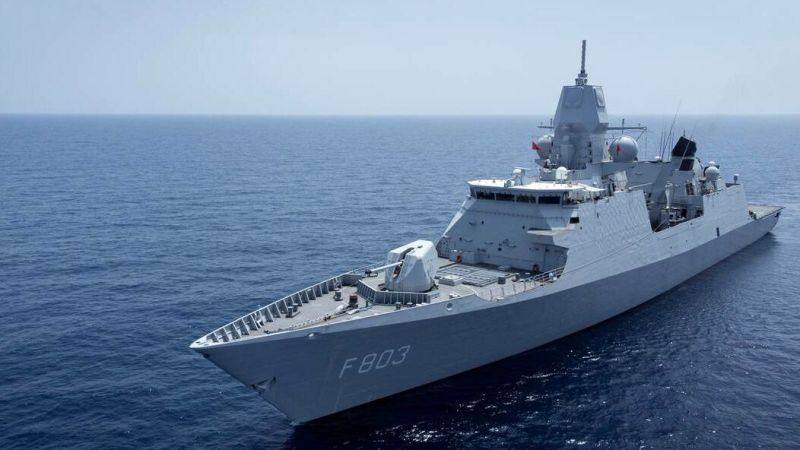A Dutch warship was harassed by Chinese military aircraft in the East China Sea on Friday, the Netherlands said, becoming the latest country to accuse Beijing’s forces of initiating potentially unsafe encounters in international waters.
In a statement Friday, the Dutch Defense Ministry said two Chinese fighter jets circled the frigate HNLMS Tromp several times, while its marine patrol helicopter was “approached” by two Chinese warplanes and a helicopter during a patrol.
“This created a potentially unsafe situation,” the statement said.



I mean this is just definitionally wrong. You can’t acknowledge the existence of exclusive economic zones without also recognizing international and territorial waters.
“The difference between the territorial sea and the exclusive economic zone is that the first confers full sovereignty over the waters, whereas the second is merely a “sovereign right” which refers to the coastal state’s rights below the surface of the sea. The surface waters are international waters.[2”
No, the Chinese government is trying to both have their cake and eat it. They are acknowledging the idea of internationally recognized law, but ignoring the aspects they do not want to adhere to.
By definition economic exclusion zones only apply to the resources beneath the surface, the surface itself is international waters. The water people are allowed to protect as if it were sovereign land is only territorial waters, which extend 200 miles from the recognized Continental shelf.
Actually, this isn’t the full story. Military activities in a nation’s EEZ is a point of contention: countries like Brazil, India, Pakistan, China, Iran, Malaysia, and Indonesia object to this. It’s not explicitly defined in UNCLOS whether military activities should be permitted, and it’s the prevailing view of countries that make up almost half of the world’s population that it shouldn’t be. International law hasn’t really been extensively challenged in this regard until very recently (the past decade or two), so the debate on military activities within EEZ is still that, a debate.
Meaning there is no provision against it. Article 87 and 58 are both very broad in their protections to any state operating outside of territorial waters, there is no reason to assume the freedom of movement only applies to commercial vessels.
Only so much that international law in and of itself is still up for debate. If that’s your argument then the notion of international law is moot, and we will be doomed to regress fully back to might makes right foreign policy.
I also feel as if you are attempting to narrow the argument into a specific corridor that suits the Chinese perspective. Yes there are countries that disagree with the broad protections offered by the current international law, but that’s not the only problem China has been rubbing against in regards to LOSC. They aren’t just attempting to govern military movements in their EEZ, they are attempting to expand it, and police the movement of both military and commercial traffic.
I mean, they basically have a paramilitary fishing fleet that aggressively and violently violates other countries EEZ and territorial waters all the time.
I think the point of LOSC is to deescalate points of contentions in spaces where we all have to operate. The rights of freedom of movement serves China just as much as it does the United States.
I think, I feel
Ok, glad that we agree that we’re operating in a grey zone for international law. I respect your opinion.
Yeah, it’s an opinion. Just like yours, I just don’t pretend to represent opinions as facts.
Yeah, I mean what else can you expect from a system that was fabricated to substantiate the clean wehrmacht theory?
But, if we’re sticking to the main topic. According to UNCLOS, travel in everything but territorial water has pretty broad protections.
Whether international law is enforceable, logical, or ethical is a different debate that I wouldn’t want to throw my hat into.
According to UNCLOS, which the US isn’t signatory to? Some “international” ass law
Right, but we are talking about China whom are signatories…
Like I said, your issue seems to be raised at the concept of international law. Not the individual international agreement we have been speaking about.
Again, your claim is that if something isn’t explicitly specified, then it’s allowed. This is the difference between common law (popular in the UK, US, Canada, Australia, etc.) and civil law (used everywhere else, including most of Europe, South America, China, Russia, etc.)
The question isn’t about the concept of international law, but whether international law should follow civil, common, customary principles (or even Sharia, Halakhah).
No, my claim is that the law specifies all surface traffic is permitted. You are interpreting all traffic as excluding military traffic.
The difference between civil law and common law is that common law is more based on jurisprudence and interpretation. Civil law is based on codified rules and doctrine. Meaning that in civil law, if you wanted to exclude military traffic, there would be a codified specification to support this interpretation.
If we are evaluating unclos as civil law, then the fact that there isn’t a codified definition of what traffic can go where is even more damning to your argument…